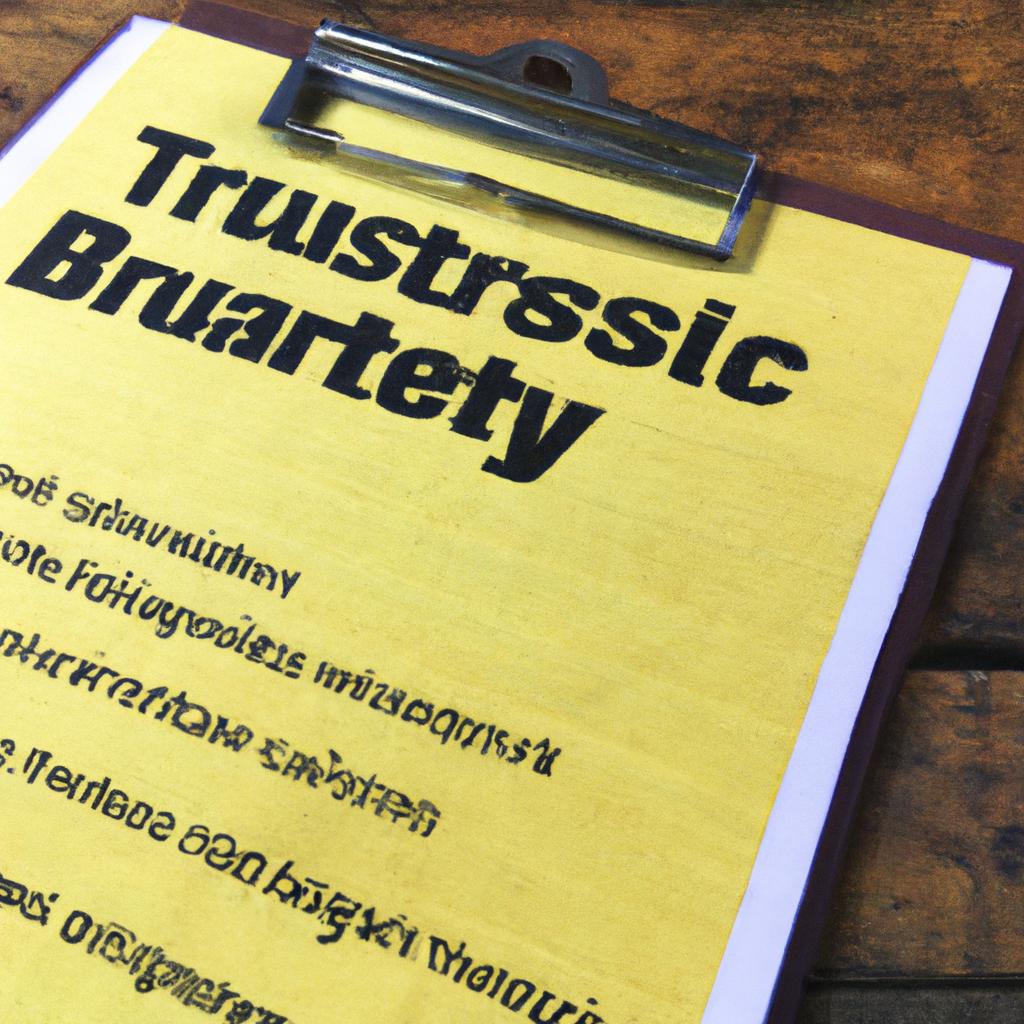In the intricate tapestry of legal relationships, trust serves as the unifying thread that binds individuals, families, and businesses together in mutual understanding and reliance. Shared trust, in particular, represents a unique synergy where multiple parties join hands in a collective belief in the reliability and integrity of one another. At Morgan Legal Group, located in the bustling metropolis of New York City, we specialize in navigating the complex terrain of estate planning, probate, elder law, Wills, and trusts with precision and expertise. Join us as we delve into the nuances of shared trust and its profound significance in the realm of legal affairs.
Establishing Shared Trust: Building Strong Relationships with Clients
Building strong relationships with clients is a cornerstone of success in any industry. At Morgan Legal Group, we prioritize establishing shared trust with our clients to ensure that their legal needs are met with the utmost care and attention. By fostering a sense of mutual respect and understanding, we can work together effectively to achieve the best possible outcomes.
Trust is a vital component of any professional relationship, and we understand the importance of earning and maintaining our clients’ trust. Through open communication, transparency, and a commitment to excellence, we strive to build lasting partnerships with each client we serve. By working together collaboratively, we can navigate complex legal matters with confidence and achieve success for our clients.

Beneficial Factors of Shared Trust in Estate Planning
Shared trust in estate planning can offer numerous beneficial factors that can positively impact the outcome of one’s estate. When individuals share a high level of trust in the estate planning process, they are more likely to communicate openly and honestly with each other, leading to a smoother and more efficient planning process. This open communication can help ensure that all parties involved are on the same page and have a clear understanding of the goals and objectives of the estate plan.
<p>Additionally, shared trust can help foster collaboration and teamwork among family members and other beneficiaries, leading to a greater sense of unity and harmony within the family. This can be especially important when dealing with complex family dynamics or sensitive issues that may arise during the estate planning process. By building trust and working together towards a common goal, individuals can create a solid foundation for their estate plan that can withstand any challenges that may arise in the future.</p>

Maintaining Shared Trust: Effective Communication and Transparency
Effective communication and transparency are the cornerstones of maintaining shared trust in any relationship, whether it be personal or professional. By consistently keeping lines of communication open and honest, parties involved can ensure that misunderstandings are minimized and trust is built upon a solid foundation. Transparency, in particular, is key in fostering trust as it allows all parties to see and understand the motivations and actions of others involved.
In order to maintain shared trust through effective communication and transparency, it is important to prioritize clear and timely communication. This includes actively listening to others, providing honest and open feedback, and keeping all parties informed of important developments. Additionally, being transparent in all dealings and decisions helps to build credibility and trust among those involved. By following these principles, relationships can be strengthened, and trust can be maintained over the long term.
| Importance of Communication | Why Transparency Matters |
|---|---|
| Minimizes misunderstandings | Builds credibility |
| Fosters trust | Strengthens relationships |

ensuring-the-longevity-of-shared-trust-through-ethical-practices”>Ensuring the Longevity of Shared Trust through Ethical Practices
When it comes to , there are several key considerations that must be taken into account. First and foremost, transparency is essential. This means being open and honest in all communications and transactions, and ensuring that all parties involved are fully informed every step of the way. By maintaining transparency, trust can be built and sustained over time.
Additionally, **integrity** is paramount. Upholding the highest moral and ethical standards in all dealings helps to establish a solid foundation of trust. This includes acting in the best interests of all parties involved, even when faced with difficult decisions. By consistently demonstrating integrity, trust can be solidified and maintained for years to come.
Q&A
Q: What is shared trust and why is it important in relationships?
A: Shared trust is the mutual belief and confidence between two individuals that they can rely on each other. It is important in relationships because it fosters a sense of security, openness, and connection.
Q: How can shared trust be built and maintained?
A: Shared trust can be built and maintained through consistent communication, honesty, empathy, and respect. It is also important to follow through on promises and demonstrate reliability.
Q: What are some signs that shared trust is lacking in a relationship?
A: Signs that shared trust is lacking in a relationship include dishonesty, lack of communication, defensiveness, secrecy, and a sense of unease or insecurity.
Q: How can trust be repaired if it has been broken in a relationship?
A: Trust can be repaired in a relationship through open and honest communication, acknowledging the breach of trust, taking responsibility for one’s actions, and making a concerted effort to rebuild trust over time.
Q: How does shared trust contribute to overall relationship satisfaction?
A: Shared trust contributes to overall relationship satisfaction by creating a strong foundation of security and emotional intimacy. It allows individuals to feel safe, understood, and supported, leading to greater levels of happiness and fulfillment in the relationship.
Final Thoughts
In a world where individualism often reigns supreme, the concept of shared trust serves as a reminder of the power of unity and collaboration. By fostering a sense of mutual reliance and understanding, we can create a stronger, more interconnected community. Let us continue to build bridges of trust and support, for in doing so, we not only enrich our own lives but also contribute to a more harmonious and compassionate society. As we navigate the complexities of our modern world, let us always remember that shared trust is the foundation upon which lasting relationships and meaningful connections are built.
 Shared Trust: Building Strong Relationships and Communities
Shared Trust: Building Strong Relationships and Communities
Trust is the foundation of any successful relationship, whether it’s personal or professional. It is the belief or confidence that you have in another person, organization, or community. Trust is what allows us to build strong relationships and foster a sense of belonging and security. When trust is shared, it creates a bond and connection between people and contributes to building a better society. In this article, we will explore the concept of shared trust, its benefits, and practical tips for building and maintaining it.
Defining Shared Trust
Shared trust is essentially trust that goes both ways. It is the mutual understanding and belief that we have in others and their actions. Shared trust means that both parties are willing to be vulnerable and show their authentic selves without fear of being judged or betrayed. It’s a feeling of safety and security that comes from knowing that the other person has our best interests at heart.
At its core, shared trust is a two-way street. It requires not only trusting others but also being trustworthy. This means being reliable, transparent, and ethical in our actions and words. It’s a continuous process of demonstrating our trustworthiness and earning the trust of others.
Why Shared Trust is Important
Shared trust is the key to building strong relationships and communities. Here are some reasons why it is crucial for individuals and society as a whole:
1. Promotes Positive Relationships – Shared trust creates a positive environment where people feel safe and comfortable to be themselves. It leads to stronger and more meaningful relationships between individuals, families, and communities.
2. Fosters Cooperation and Collaboration – When there is shared trust, people are more likely to work together towards a common goal. They are willing to share their ideas, skills, and resources, which leads to better problem-solving and decision-making.
3. Boosts Productivity and Efficiency – In a workplace setting, shared trust leads to a more productive and efficient team. When employees trust each other, they are more likely to communicate openly, seek feedback, and collaborate on projects. This leads to increased innovation, better quality work, and higher job satisfaction.
4. Enhances Mental Well-being – Trusting relationships can have a significant impact on our mental health. It creates a sense of belonging and connection, reducing feelings of loneliness and isolation. When we feel safe and secure, we are also more likely to open up and seek support during difficult times.
Practical Tips for Building and Maintaining Shared Trust
Now that we understand the importance of shared trust let’s look at some practical tips for building and maintaining it in our relationships and communities:
1. Communicate Effectively – Clear and open communication is essential for building trust. It is crucial to be honest and transparent in our interactions with others, whether it’s at home or in the workplace. Make sure to listen actively and respond with empathy.
2. Be Dependable – Consistency and reliability are key traits of a trustworthy person. Make sure to follow through on your commitments and be proactive in communicating any changes. This will show others that they can count on you.
3. Respect Boundaries – Respecting each other’s boundaries is crucial for building trust. It’s important to communicate and establish boundaries early on in a relationship and be respectful of them. This will help to create a safe and comfortable environment for both parties.
4. Lead by Example – To build shared trust, you must also be trustworthy. Practice what you preach and lead by example. Your actions should align with your words, and you should strive to be a role model for others to follow.
5. Repair Trust When Broken – Inevitably, trust may be broken in any relationship. When this happens, it’s essential to take responsibility, apologize sincerely, and take necessary steps to repair the damage. This shows that you are committed to rebuilding trust and can strengthen the relationship in the long run.
Case Study: Building a Culture of Shared Trust at Google
Google is an example of a company that has successfully built a culture of shared trust among its employees. Their workplace policies and practices foster a sense of transparency and open communication. Ideas are encouraged, and everyone’s opinions are valued, regardless of their role in the company.
The company’s leaders practice what they preach and lead by example, which has created an environment where employees feel comfortable taking risks and being themselves. This culture of shared trust has led to successful collaborations, innovative ideas, and overall happier and more productive employees.
In Conclusion
Shared trust is the foundation of strong relationships and communities. It leads to better communication, collaboration, and overall well-being. Building and maintaining shared trust requires active effort and a commitment to being trustworthy. By following the practical tips outlined in this article and being intentional in our relationships, we can foster a culture of shared trust and create stronger, more connected communities.

